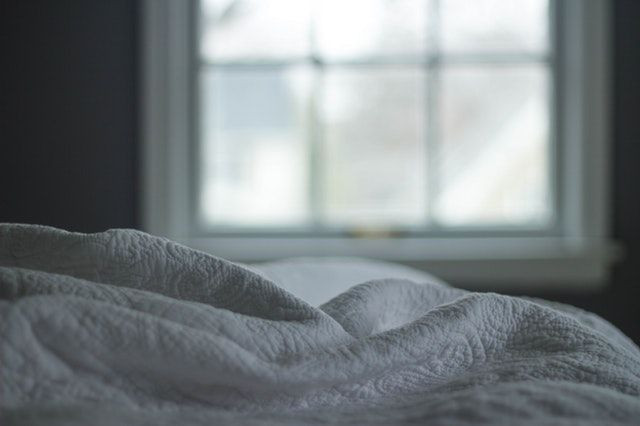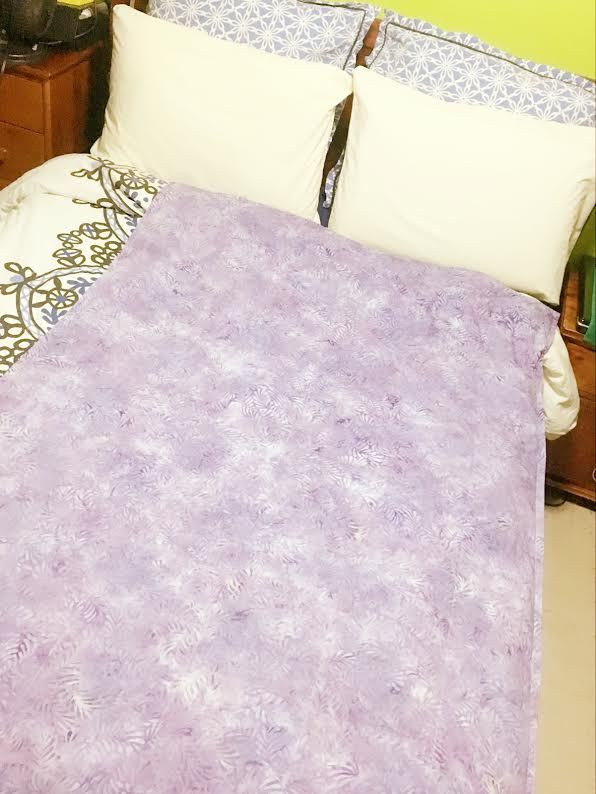Weighted Blanket For Adults: How Deep Pressure Touch Helped Me Sleep Better Through The Night

Every night, I go to bed with four pillows, a blanket, two comforters, and five stuffed animals to lull myself to sleep. Yet, I continue to toss and turn in the middle of the night, looking for the right position to sleep tight. Over a month ago, I decided to add another item to my bed — a weighted blanket.
This natural sleep aid has recently gained popularity as companies like Gravity Blanket are launching their own version of the extra-heavy blanket. I reached out to Mosaic Weighted Blankets in Austin, Texas, where co-founder Laura Lemond guided me through the process of ordering a weighted blanket. I provided my height, weight, and my favorite color (lavender) to receive a blanket that is individually tailored to me.
Read More: Weighted Blanket For Anxiety, Trouble Sleeping
In order to get the full benefits of a weighted blanket, it's best to choose one that has the right amount of heft. A rule of thumb is to calculate 10 percent of your body weight and add one to two pounds. Melissa Bamberg, creator of the Nodpod eye pillow, believes deep pressure therapy (DPT) — adding extra pressure on the body via hugs, weighted vests, blankets, stuffed animals, or lap pads — can be helpful as a form of relief and relaxation.
"This phenomenon is widely unknown because weighted blankets are not commercially practical, because they have to be customized to the user’s body weight; 10 percent. Therefore, you don’t see it in the stores and it is not discussed," she told Medical Daily.
Similar to wearing weighted vests during dental X-rays, the weighted blanket is placed on top of the body, evenly distributing pressure. My blanket weighed a total of 13 pounds; heavy enough for me to take a cab home rather than hold it on a subway ride.
I immediately thought, "Could I possibly sleep with all this weight on me?"
On my first night, I placed the pretty lavender weighted blanket on my body, followed by my regular blanket, and two sets of comforters. Interestingly, I didn't feel any extra weight on my body. Although the weight was evenly dispersed, I did not experience discomfort anywhere, as I slept soundly through the rest of the night.
The following days and weeks were similar. Despite falling asleep late at night, I managed to ease my way into a slumber, without waking up until the morning. I even slept through my alarm more than I usually do; I felt this weighted blanket was a blessing for my sleep, but a curse for my timeliness, or lack thereof.
Weighted blankets are believed to boost sleep via DPT, which increases serotonin levels in the body. Serotonin production is necessary to release melatonin, the sleep hormone — this determines when we go to sleep and wake up based on our circadian rhythm. We'll be able to go fall asleep faster; reduce anxiety; go into deeper sleep; and move less throughout the night.

A 2015 study in the Journal of Sleep Medicine & Disorders found a weighted blanket had positive effects on insomnia. The researchers noted the weighted blanket led to an increase in sleep time, as well as a decrease in the participants' movements while asleep. The participants reported they liked sleeping with the blanket, found it easier to settle down to sleep and had an improved sleep where they felt more refreshed in the morning.
The extra weight provided a feeling of comfort and support throughout my body; it limited my overall movement in the night. I started to toss and turn less throughout the weeks, which left me better able to fall asleep. I live on a busy avenue where trucks and cars frequent the roads, even late at night. The idea I could fall asleep without noise pollution in New York City seemed almost surreal.
I also suffer from the occasional bout of night terrors. This sleep disorder, characterized by tachycardia (increased heart rate), tachypnea (increased breathing rate), and sweating during episodes, occurs during the transition from stage 3 non-rapid eye movement (REM) sleep to stage 4 non-REM sleep. This is where delta waves are produced from the brain and the waves gradually become slower as the sleep cycle begins.
Read More: My Story: What It's Like To Be Terrified While Asleep
My episodes were less frequent throughout the month with the weighted blanket. This is because DTP leads to chemical changes in the brain. Nervous system activity decreases under the weight of a heavy blanket, which helps those who can't fall asleep due to anxiety.
The benefits of weighted blankets on the nervous system go beyond the bedroom. A 2012 study in the Journal of Medical and Biological Engineering found the blankets reduced anxiety in dental patients who were in high-anxiety situations. The blanket led to physiological changes in the patients' nervous system, which helped them feel more relaxed at the dentist.
Chris Brantner, founder of SleepZoo, a site that focuses on sleep tips and purchasing mattresses online, among other things, explains a weighted blanket can serve multiple uses whether it's for trouble sleeping, anxiety, or learning disorders like ADHD. It's the DPT that helps the entire body feel very protected and at ease.
"People often compare cuddling up with a weighted blanket to getting a big, comforting hug, promoting feelings of tranquility and relaxation," he told Medical Daily.
My end goal of using a weighted blanket was to improve my sleep, and I did. After four weeks, I wasn't fazed by the extra heavy layer — now part of my bedding set. I continue to sleep with it every night, but the only downfall is it's too heavy if I ever want to bring it on a plane.
I usually have trouble sleeping in a new place, whether I visit my family or friends, also known as the "first night effect." Research suggests it could be a sign that our left brain is working hard to protect us from danger.
“When we feel at risk of danger, our neurological systems, bodies, and moods react defensively on-guard to protect one with a response of fight or flight (running away), depression, anger and attack, and even a dissociative out-of-body experience,” Dr. Fran Walfish, Beverly Hills psychotherapist, author, and expert panelist on WE TV's Sex Box , previously told Medical Daily.
The pressure of a weighted blanket could potentially offset this effect by changing our brain chemistry. However, until a more compact and practical way is established, I'll use my 13-pound blanket strictly at home.
After four weeks, it has become my adult version of a security blanket.
See Also:
Published by Medicaldaily.com



























